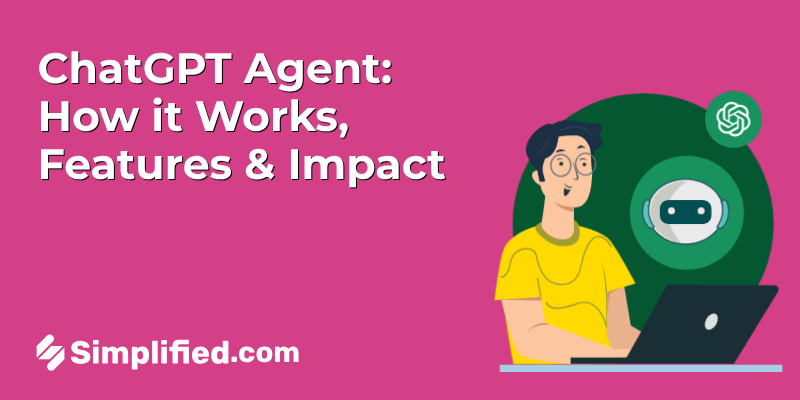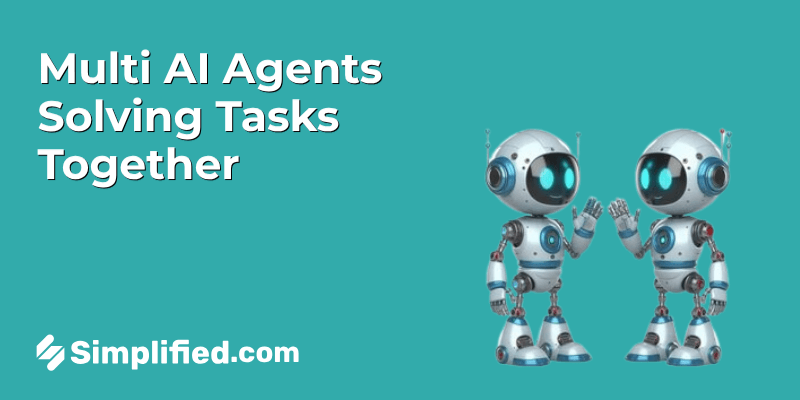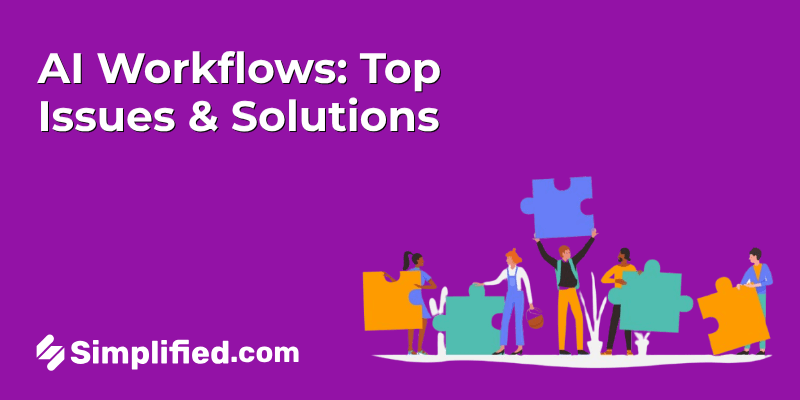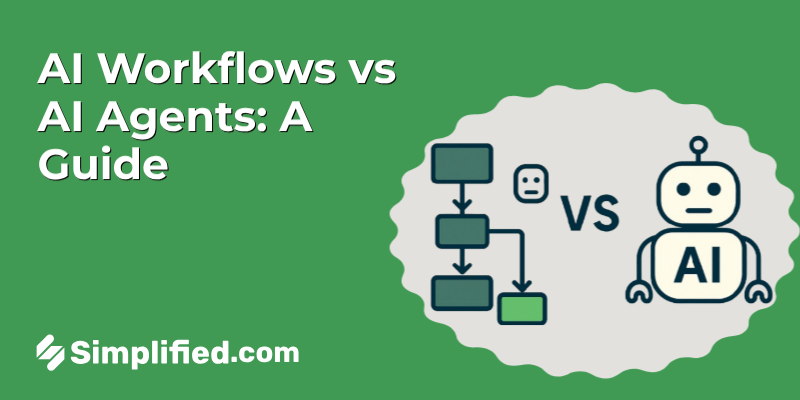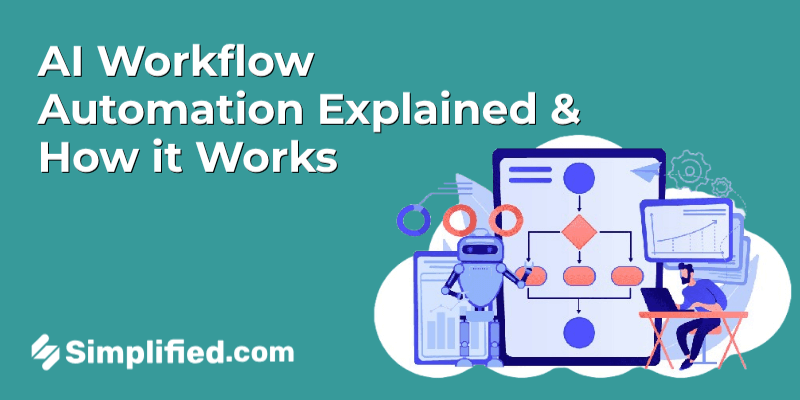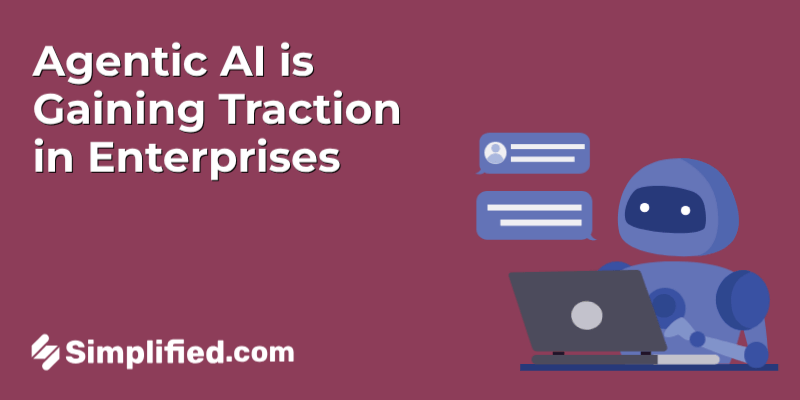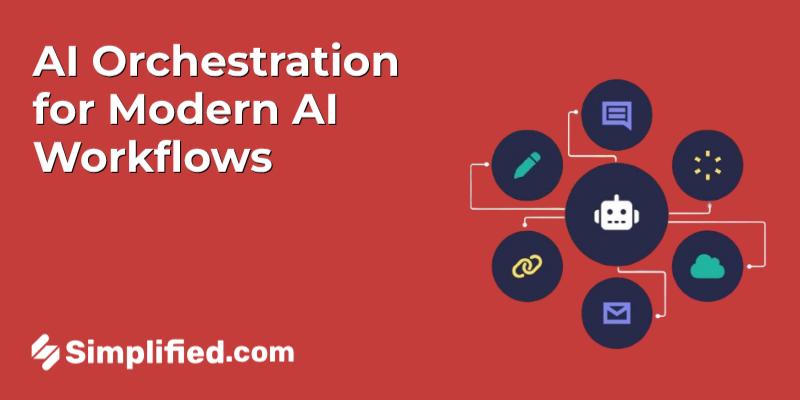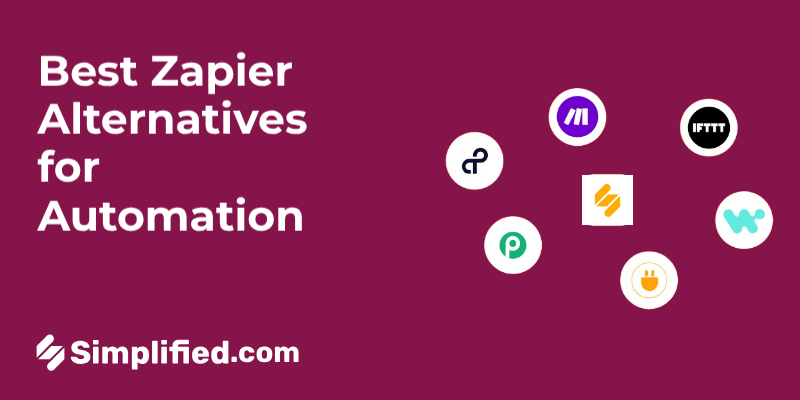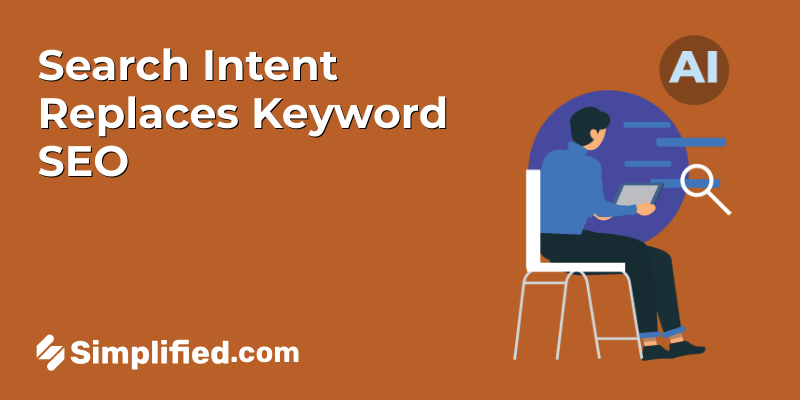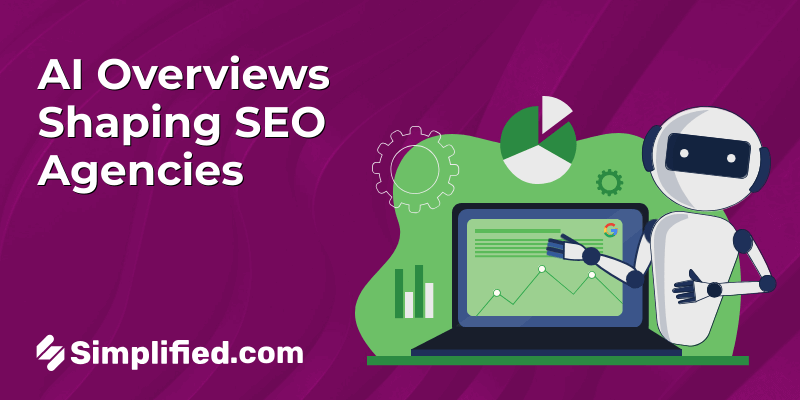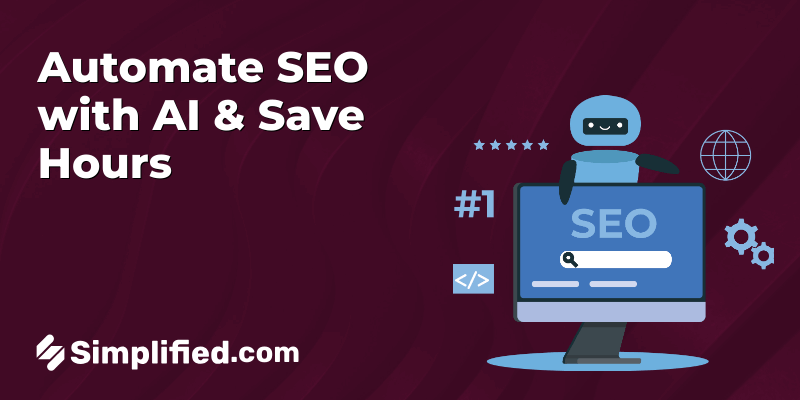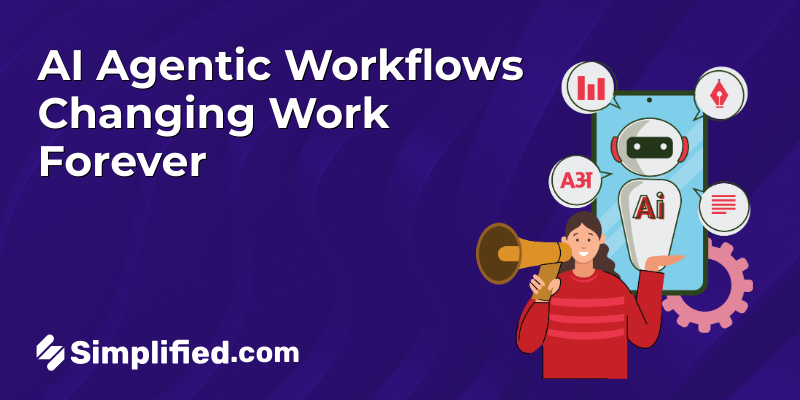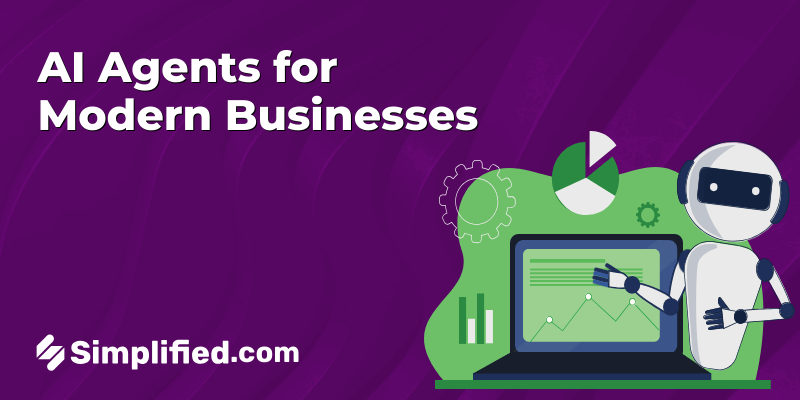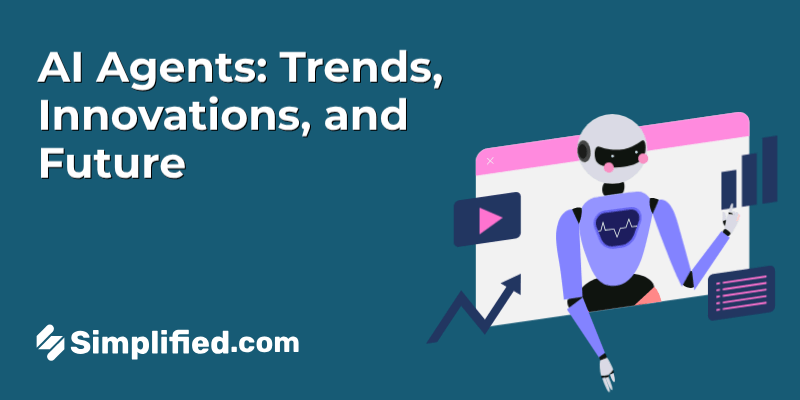
Imagine waking up in 2025 to an AI assistant that predicts your needs before you even speak. Emails drafted, meetings scheduled, and your favorite playlist starts—all without lifting a finger.
AI agents have evolved from simple chatbots into advanced, decision-making entities managing business operations, customer interactions, and personal tasks with minimal input. As industries rapidly adopt AI, 2025 is set to be a defining year.
But how did we get here? What innovations are driving AI adoption? And how will they shape the future? Let’s explore AI agents trends, evolution, applications, and possibilities of AI agents in 2025.
What Are AI Agents?
AI agents are intelligent software systems designed to perform tasks, make decisions, and automate processes with little to no human intervention.
They operate using machine learning, natural language processing, and predictive analytics to understand user behavior, optimize workflows, and provide real-time solutions.
From virtual assistants handling emails and schedules to complex systems managing supply chains and customer interactions, AI agents are transforming industries by increasing accuracy, reducing manual effort, and enhancing decision-making.
Note: AI Agents are not just LLM prompts
AI Agents: Evolution and Current State
AI agents have come a long way from simple rule-based programs to highly sophisticated systems capable of independent decision-making. The journey of AI agents can be categorized into three key stages:
1. Early AI Agents: Rule-Based Automation
The first AI agents operated on predefined rules, executing tasks based on “if-then” logic. These systems were rigid and struggled with adaptability. For example, early customer service chatbots could only respond to specific keywords, often failing to understand nuanced queries.
2. Machine Learning and Adaptability
With advancements in machine learning, AI agents began processing vast amounts of data to improve their responses. Instead of following static rules, they started recognizing patterns, learning user preferences, and making informed recommendations. Virtual assistants like Siri and Alexa emerged, improving natural language interactions and user engagement.
3. Autonomous, Decision-Making AI Agents
Today, AI agents can function independently, analyze complex scenarios, and make real-time decisions. Industries such as finance, healthcare, and e-commerce rely on AI-powered systems for fraud detection, patient diagnosis, and personalized shopping experiences. For instance, in 2023, AI-powered trading systems managed over 60% of all stock market transactions, showcasing their ability to operate at high efficiency.
This evolution reflects the emergence of Agentic AI, where AI systems not only perform tasks but also possess the autonomy to make decisions, adapt to new information, and pursue goals without constant human oversight.
The next section will explore how different sectors are adopting AI agents to optimize processes and improve customer experiences.
📌 Note: Read AI Agents for Modern Businesses: Everything You Need to Know to explore how AI agents are transforming industries.
Industries Driving AI Agent Adoption
AI agents are no longer confined to tech giants and research labs. Businesses across industries are integrating AI-powered systems to improve operations, enhance decision-making, and provide better customer experiences. Here’s how some key sectors are utilizing AI agents in 2025:
1. Finance: Fraud Detection and Risk Assessment
Financial institutions rely on AI agents to monitor transactions in real time, detect fraudulent activities, and assess risks with high accuracy. In 2024, AI-driven fraud detection reduced financial fraud losses by 35%, significantly improving security in banking and e-commerce transactions.
2. Healthcare: AI-Powered Diagnosis and Patient Care
AI agents assist doctors by analyzing medical records, suggesting treatments, and even predicting diseases before symptoms appear. For example, AI models now detect certain types of cancer with 95% accuracy, reducing diagnostic errors and enabling early intervention.
3. E-Commerce: Personalized Shopping Experiences
Retailers use AI agents to analyze consumer behavior, recommend products, and manage inventory efficiently. In 2025, AI-driven recommendation engines contribute to 40% of total online sales, making them an essential tool for e-commerce businesses.
4. Customer Service: 24/7 AI-Powered Support
AI chatbots and virtual assistants are handling millions of customer inquiries daily, reducing wait times and improving satisfaction rates. An AI agent in customer service plays a key role in delivering this efficiency. Companies using AI agents for customer service have reported a 60% reduction in response times, allowing human agents to focus on complex queries.
5. Manufacturing: Predictive Maintenance and Automation
AI agents analyze machinery data to predict failures before they occur, minimizing downtime and maintenance costs. By 2025, predictive maintenance is expected to save manufacturers $500 billion annually by preventing equipment failures.
As AI agents continue to shape these industries, their role will only expand, making them indispensable for businesses looking to stay competitive. Up next, we’ll explore the latest AI tech trends driving these innovations.
Top AI Agent Trends for 2025
AI agents are evolving rapidly, integrating advanced technologies to become more autonomous, intelligent, and efficient. In 2025, several key trends are shaping their development and adoption across industries.
1. Multimodal AI: Understanding Text, Voice, and Images Together
AI agents are no longer limited to text-based interactions. Companies like Google DeepMind are developing multimodal AI systems that can process and respond to text, speech, and images simultaneously. This technology allows AI assistants to interpret a user’s voice commands while analyzing related documents or images in real time.
Example:
Microsoft’s Copilot AI now integrates with Office apps to generate reports based on voice commands and document analysis, reducing manual work for professionals.
2. Autonomous AI Agents: Self-Executing and Decision-Making Systems
AI agents are moving beyond assisting humans—they are now capable of making decisions and executing tasks independently. Autonomous agents like Auto-GPT and BabyAGI can break down complex tasks, plan strategies, and execute them without continuous human input.
Example:
E-commerce companies are deploying AI agents that automatically adjust pricing strategies based on market demand and competitor analysis, increasing revenue without manual intervention.
3. AI Agents in Cybersecurity: Real-Time Threat Detection
Cybersecurity threats are becoming more sophisticated, and AI agents are stepping in to provide real-time protection. These systems analyze network activity, detect anomalies, and respond to cyberattacks instantly.
Example:
Darktrace, an AI-driven cybersecurity company, uses AI agents to detect and neutralize cyber threats in real time. Their system prevented a major ransomware attack on a global financial firm in 2024, saving them millions in potential damages.
4. Personalized AI Agents: Custom Assistants for Individuals and Businesses
Instead of one-size-fits-all solutions, AI agents are being customized for specific industries, companies, and even individuals. These personalized agents learn from user behavior and preferences to provide tailored support.
A dental marketing group used DelegateFlow‘s AI agents to manage social media for over 60 studios, reducing operational costs by 35% and improving on-time deliveries.
5. Proactive Problem-Solving AI Agents
Unlike traditional AI systems that respond only when prompted, proactive AI agents anticipate issues and take action before problems arise. These agents analyze data patterns, predict potential challenges, and implement solutions without waiting for human intervention.
Example:
A logistics company uses AI agents to monitor supply chain operations. If the system detects potential delivery delays due to weather conditions, it automatically reroutes shipments, notifies customers, and adjusts inventory levels—preventing disruptions before they happen.
Proactive AI agents are transforming industries by minimizing downtime, improving efficiency, and enhancing customer experience.
Bonus: How AI Agentic Workflows Are Changing the Way We Work Forever
Real-World Applications and Case Studies
AI agents are not just theoretical concepts—they are actively shaping industries worldwide. Here are some real-world applications demonstrating their impact in 2025.
1. PayPal’s AI-Powered Fraud Detection
PayPal processes millions of transactions daily, making it a prime target for cybercriminals. To combat fraudulent activities, the company has deployed AI-driven fraud detection systems that analyze patterns and flag suspicious transactions in real time. In 2024, these AI agents helped reduce fraud rates by 35%, saving the company billions in potential losses.
2. IBM Watson Health in Cancer Treatment
IBM Watson Health has been instrumental in assisting doctors with diagnosing complex diseases. At Memorial Sloan Kettering Cancer Center, AI agents analyze vast medical datasets to recommend personalized treatment plans. Studies indicate that AI-assisted diagnoses have improved accuracy by 95%, reducing misdiagnosis rates and leading to better patient outcomes.
3. Amazon’s AI-Powered Recommendations
Amazon’s recommendation engine, powered by AI agents, analyzes customer behavior, past purchases, and browsing history to suggest relevant products. AI-driven recommendations now contribute to 40% of Amazon’s total sales, proving the value of personalized marketing strategies.
Bank of America’s Erica AI Chatbot
Bank of America launched Erica, an AI-powered virtual assistant, to handle customer inquiries. Erica interacts with millions of users each month, providing banking insights, fraud alerts, and financial planning advice. Since its implementation, customer wait times have dropped by 60%, improving overall satisfaction.
Tesla’s AI-Driven Production Monitoring
Tesla uses AI agents in its Gigafactories to monitor production lines and predict equipment failures before they happen. By analyzing sensor data, these AI systems have reduced unplanned downtime by 30%, leading to more efficient production and cost savings.
AI agents are proving their value across various industries, demonstrating their potential to enhance business processes and decision-making. In the next section, we’ll explore the future outlook for AI agents in 2025 and beyond.
Future Outlook: Where AI Agents Are Headed Next
AI agents are on a path toward greater autonomy, intelligence, and integration across industries. As technology advances, several key developments will shape their future.
1. AI Agents Becoming More Autonomous
Currently, most AI agents still require human oversight. However, advancements in reinforcement learning and self-improving algorithms will allow AI agents to operate with minimal human intervention. According to a recent survey conducted by PagerDuty, as of April 2025, 51% of companies have already deployed AI agents in their operations. An additional 35% plan to implement AI agents within the next two years, indicating that by 2027, 86% of companies expect to be operational with AI agents.
What to Expect:
- AI-powered personal assistants that can handle complex workflows, such as scheduling meetings, drafting reports, and managing projects.
- Enterprise AI agents capable of making financial decisions, negotiating contracts, and optimizing supply chains.
2. AI Agents in Robotics: Expanding into Physical Workspaces
AI agents are becoming more common in robotics, shifting from software-based applications to tasks in physical environments. Companies like Boston Dynamics and Tesla are at the forefront of this development:
- Boston Dynamics has deployed over 1,500 Spot robots, used for monitoring industrial sites and assisting in hazardous environments. The company’s Stretch robot is designed for warehouse automation, handling repetitive tasks like unloading boxes.
- Tesla’s Optimus humanoid robot, introduced in 2024, is being trained for industrial and household tasks, with ongoing improvements to its mobility and object-handling capabilities.
The AI-powered robotics market is expected to grow from $17.89 billion in 2024 to $23.12 billion in 2025. Personal assistance robots, including home assistants and elder care companions, are projected to see significant expansion by 2030.
What to Expect:
- AI-driven robots assisting in elder care, helping with daily tasks, and monitoring health conditions.
- Autonomous delivery drones and warehouse robots improving logistics and supply chain operations.
3. Ethical and Regulatory Challenges
As AI agents become more advanced, ethical concerns and regulatory frameworks will play a crucial role in their deployment. Governments and organizations are already working on AI policies to ensure transparency, accountability, and fairness.
What to Expect:
- Stricter AI regulations on data privacy and decision-making transparency.
- AI ethics boards in corporations to oversee AI deployments and prevent bias.
4. AI Agents in Education: Personalized Learning Assistants
AI-powered learning tools are becoming more common in education, helping students with personalized instruction and feedback. These systems analyze learning patterns to adjust lesson difficulty and provide targeted support. For example, Arizona State University (ASU) uses AI-driven tutoring systems to assist students with coursework, particularly in math and science. Their AI assistant provides personalized study recommendations based on performance data.
What to Expect:
- Automated grading systems that provide instant feedback and suggest personalized study plan
- AI tutors that modify lesson difficulty in real time based on student responses.
5. AI Agents and Human Collaboration: The Hybrid Workforce
Rather than replacing humans, AI agents are expected to work alongside them, enhancing productivity. Companies are investing in human-AI collaboration models to maximize efficiency.
What to Expect:
- AI-generated insights helping business leaders make informed decisions faster.
- AI co-pilots assisting professionals in fields like law, medicine, and engineering.
How DelegateFlow’s AI Agents Keep You Ahead
Staying ahead requires more than just automation—it means using AI that can manage workflows, support decision-making, and handle tasks with minimal supervision. DelegateFlow’s AI agents simplify operations and improve efficiency across industries.
How DelegateFlow Supports Your Business:
- Automated Task Management – Handles social media updates, email responses, and other routine work, freeing up time for more critical tasks
- Data-Driven Decision Support – Provides insights and recommendations based on real-time data to improve planning and execution.
- Smooth System Integration – Works seamlessly with CRM, marketing tools, and other business systems for a connected workflow.
- Scalability Without Extra Overhead – Adapts to business growth without adding manual workload or increasing staffing needs.
- Continuous Operations – Works 24/7 to ensure deadlines are met and tasks are completed without interruptions.
With DelegateFlow, businesses can shift from simple automation to AI-driven processes that anticipate needs, manage complex tasks, and support long-term success.
Final Thoughts
AI agents are no longer just a glimpse into the future—they are actively reshaping how we work, create, and interact with technology. From automation and enhanced decision-making to real-time problem-solving, AI agent trends show a shift toward more proactive and autonomous systems. As AI continues to evolve, those who embrace it will find new opportunities to innovate and stay ahead. The key is not just understanding AI but finding ways to integrate it effectively into everyday workflows.
The future of AI isn’t coming—it’s already here. The question is: How will you use it?

